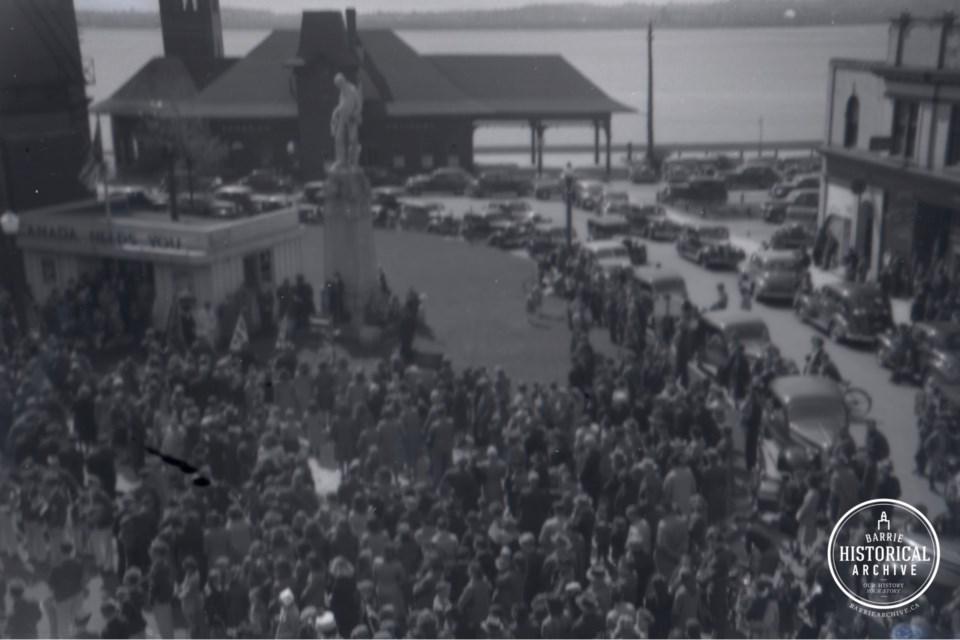V-E (Victory in Europe) Day was when the conflict with Hitler’s Germany ended with a surrender on May 7, 1945.
The Allied countries, including Canada, responded by declaring May 8 the official day of celebration.
Barrie, like other cities and towns across the country, was quick to organize a day of thanksgiving, honouring of our military and, of course, some partying, too.
While elementary schools conducted their own programs of music, readings and other tributes, the Barrie Collegiate Institute (BCI) band led a parade down Dunlop Street to Memorial Square. More than 2000 people gathered to listen to the band and participate in the V-E- Day event.
Rev. James Ferguson, chairman of the Barrie Ministerial Association, opened the service of thanksgiving ending of the Second World War and the honouring of those who gave their lives. Mayor Peter Sinclair addressed the crowd as well.
Given that restaurants (and most likely everything else) were closed on V-E Day, the Barrie Active Service Club and Canteen recorded one of its busiest days ever. Hundreds of cups of coffee, as well as food, were served from 11 a.m. until their supplies were nearly exhausted. It was estimated that 1,300 servicemen visited the canteen that day.
The festivities continued with a special dance that evening. At 10 p.m., Mayor Sinclair spoke again, along with Rev. H.R. Howden. A reading by Miss Rhoda Young was followed by apple juice and biscuits for the servicemen.
Some wartime hardships on the home front did not end automatically with V-E Day. Ration books, which had been introduced in 1942, started with gas, but eventually sugar, coffee, tea, butter and meat were also rationed … and these restrictions extended to restaurants as well. So-called ‘victory gardens’ were a way for people to supplement their rations.
Fortunately, rationing did not last for the entire war. But it was reintroduced from 1945 to 1947 for certain kinds of meat, as a way to help feed European countries devastated by the war and experiencing food shortages. Meat tokens were rolled out in 1945 and used as change, should the shopper not use the entire value of their ration coupon. These meat tokens were apparently made of wood fibre, making them difficult to counterfeit.
Other post-war initiatives were underway, such as the Barrie Victory Loan Committee encouraging folks to buy bonds. The Dominion-Provincial Committee on Farm Labour, now more than ever, also needed thousands of high school students to work on farms or in Farm Service Camps to help the agricultural industry feed European countries.
The Bank of Toronto, and probably others, was advertising help with grants, university and technical training and business loans, while the local Bell Telephone office was gearing up to start improvements to its existing equipment and expand service to rural communities with a new workforce, once supplies were available to them again.
Also in 1945, conversion of farmland, such as 35 acres of Newton’s Farm, to subdivisions would create the necessary new housing for Barrie’s growth resulting from the influx of returning servicemen and their families.



